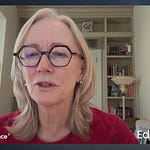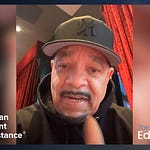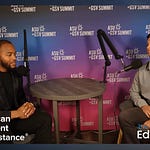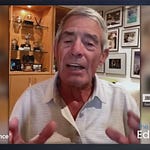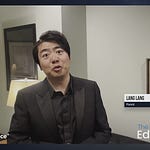In the latest episode of our one question podcast, Jon Fortt, journalist and CNBC news anchor, joined me and
to discuss the importance of building skills that will prepare students no matter how technology changes the future of work. He described the experiences he pursued that prepared him to communicate effectively and work well in a team.Michael Horn:
Today, we're welcoming journalist and news anchor Jon Fortt. You may recognize Jon from Closing Bell Overtime, the business news show that he co anchors on CNBC. Or perhaps you know him from Fortt Knox, the podcast and streaming channel that's all about tech leadership and innovation, that he created. We’re so excited to have him on our podcast here today.
Jean Eddy:
We certainly are, Michael. Jon, as Michael mentioned, you are now well on your way in your journalism career. But for this question, I want to go back to when you were still identifying your career path. How did you find your path to being a journalist and business news anchor? And what are the lessons you'd share for adults guiding middle and high school kids with career advice?
Jon Fortt:
My path to being a journalist started really in high school. And when I was in high school, I really wasn't known for journalism. I did participate in the student paper. I was Opinion Editor for a little bit, but mostly I was known for being in fall plays and doing student government, Junior Class President, Student Government President. So I think in a way, people would be surprised that I ended up doing journalism and TV journalism. Actually, before I started taking newspaper classes, I studied architecture as an elective. So my main piece of advice for educators in middle school and high school, preparing kids for careers would be don't!
Don't prepare them for careers because the careers that we think are going to exist tomorrow probably won't. And really what they should be doing, if they're interested in media, if they're interested in journalism, the writing, the speaking, the explaining, is working on projects that involve that, but more collaborating with each other on written projects, spoken projects, podcasts, broadcasts, understanding how to communicate both with an audience and with a team to create a piece of content for an audience. Because I don't think that's going to change.
Wherever this AI era takes us, it's going to have a lot to do with that—figuring out how to use technology, work together, collaborate, and get something done. But the careers that exist today won't exist tomorrow.
I mean, when I was graduating from high school in 1994, the web browser had just been born. We certainly didn't have smartphones, no podcasts, no YouTube, no any of that, no social media. And all of that has dramatically affected how I work.
But the reason why I've been able to prepare for all of this is the portions of education that I had really had me working with other people, figuring things out and making sure a team worked in a way that everybody could push forward to the next goal.








